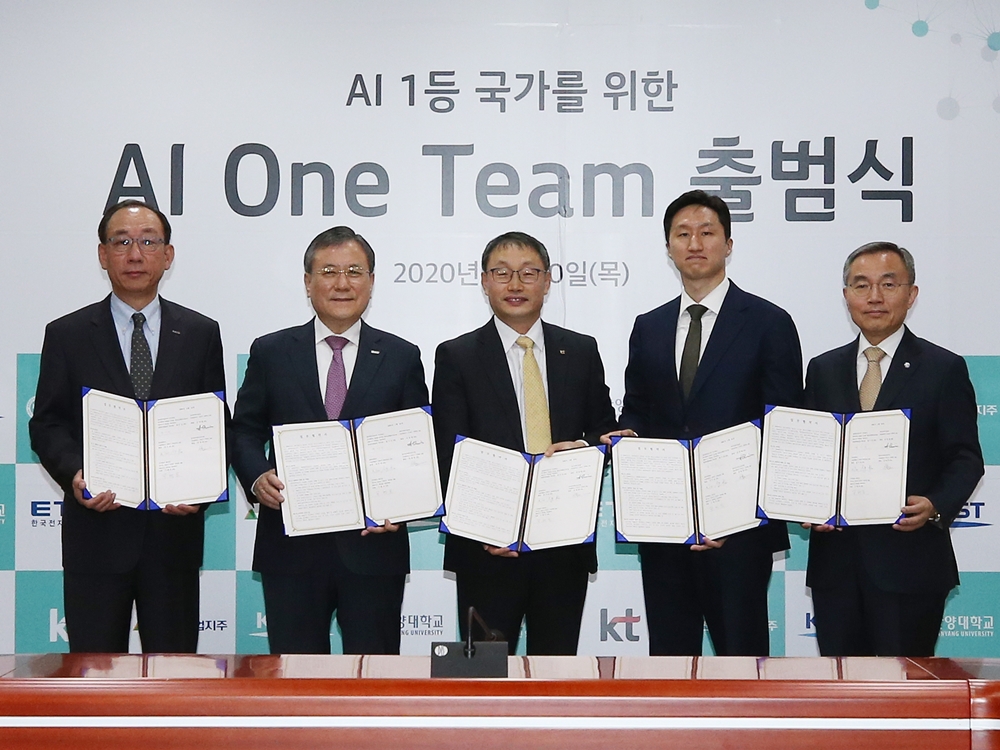policy

< ETRI President Myung Joon Kim, KAIST President Sung-Chul Shin, KT CEO Hyun-Moo Koo, Hyundai Heavy Industries Holdings Vice Presidnet Ki-Sun Chung, and Hanyang University President Woo-Seung Kim (from left) >
KAIST launched the AI collaboration alliance “AI One Team” partnering with the nation’s top telecommunications company KT, the Electronics and Telecommunications Research Institute (ETRI), Hyundai Heavy Industries Holdings, and Hanyang University on February 21.
President Sung-Chul Shin signed the MOU with KT CEO Hyun-Mo Koo, Hyundai Heavy Industries Holdings Vice President Ki-Sun Chung, President Myung Joon Kim of ETRI, and Hanyang University President Woo-Seung Kim to help the nation’s AI technology stay ahead of the global level. Vice Minister of Science and ICT Seokyoung Jang also attended the signing ceremony held at KAIST.
Four parties representing the government, industry, research institutes, and universities all agreed to collaborate to establish an educational platform fostering AI talents; develop AI technologies applicable to industrial sites; nurture an AI technology eco-system that will embrace SEMs and venture companies; and incubate startups to help improve their technological competitiveness.
KAIST will take the lead in fostering AI talents in collaboration with ETRI and Hanyang University, offering an online/offline educational program featuring AI curricula that will be practically applicable to the industry. The alliance will also create a platform that will match job seekers and companies, especially for SMEs and venture firms that are having trouble finding competitive experts.
Hyundai Heavy Industries Holdings is focusing on developing technologies in the fields of robotics and smart factories. Hyundai’s collaboration with KT is pushing the digital transformation in the new domains of 5G-based robots and smart factories. The two companies plan to expand their technological know-how to SMEs, venture firms, and startups. The secretariat of the AI One Team will facilitate collaborative projects among the partners to help produce tangible results.
President Shin expressed his high hopes on this alliance for AI technology. He declared, “The winner takes all in the field of AI. Our close collaboration will pave the way for Korea, and each of our partners will lead AI technology in the global market. We will spare no effort for this alliance.”
-
research KAIST Successfully Implements 3D Brain-Mimicking Platform with 6x Higher Precision
<(From left) Dr. Dongjo Yoon, Professor Je-Kyun Park from the Department of Bio and Brain Engineering, (upper right) Professor Yoonkey Nam, Dr. Soo Jee Kim> Existing three-dimensional (3D) neuronal culture technology has limitations in brain research due to the difficulty of precisely replicating the brain's complex multilayered structure and the lack of a platform that can simultaneously analyze both structure and function. A KAIST research team has successfully developed an integrated
2025-07-16 -
research Professor Jung-woo' Choi ‘s Team Comes in First at the World's Top Acoustic AI Challenge
<Photo1. (From left) Ph.D candidate Yong-hoo Kwon, M.S candidate Do-hwan Kim, Professor Jung-woo Choi, Dr. Dong-heon Lee> 'Acoustic separation and classification technology' is a next-generation artificial intelligence (AI) core technology that enables the early detection of abnormal sounds in areas such as drones, fault detection of factory pipelines, and border surveillance systems, or allows for the separation and editing of spatial audio by sound source when producing AR/VR conten
2025-07-13 -
event KAIST Kicks Off the Expansion of its Creative Learning Building, a 50th Anniversary Donation Landmark
KAIST announced on July 10th that it held a groundbreaking ceremony on July 9th for the expansion of its Creative Learning Building. This project, which celebrates the university's 50th anniversary, will become a significant donation-funded landmark and marks the official start of its construction. <(From left) President Kwang Hyung Lee, Former President Sung-Chul Shin> The groundbreaking ceremony was attended by key donors who graced the occasion, including KAIST President Kwang H
2025-07-10 -
event Professor Moon-Jeong Choi Appointed as an Advisor for the ITU's 'AI for Good Global Summit'
Professor Moon-Jeong Choi from KAIST’s Graduate School of Science and Technology Policy has been appointed as an advisor for "Innovate for Impact" at the AI for Good Global Summit, organized by the International Telecommunication Union (ITU), a specialized agency of the United Nations (UN). The ITU is the UN's oldest specialized agency in the field of information and communication technology (ICT) and serves as a crucial body for coordinating global ICT policies and standards. This advis
2025-07-08 -
research Development of Core NPU Technology to Improve ChatGPT Inference Performance by Over 60%
Latest generative AI models such as OpenAI's ChatGPT-4 and Google's Gemini 2.5 require not only high memory bandwidth but also large memory capacity. This is why generative AI cloud operating companies like Microsoft and Google purchase hundreds of thousands of NVIDIA GPUs. As a solution to address the core challenges of building such high-performance AI infrastructure, Korean researchers have succeeded in developing an NPU (Neural Processing Unit)* core technology that improves the in
2025-07-07